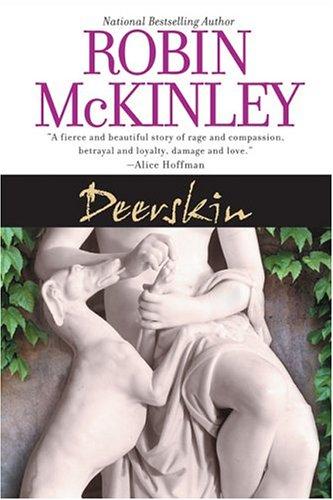emfiliane reviewed Deerskin by Robin McKinley
Review of 'Deerskin' on 'Goodreads'
5 stars
Ugly, entrancing, vivid, and quaint, this is a tough book to handle and a tough book to put down. Most of it seems to take place in a dream state, anchored by celebrations of mundane hard work. There are heartrending and awe-inspiring scenes that make you wish for a moment that it could be real, and the story leaves a lasting impression. McKinley is particularly deft at changing the tone of writing to match Lissar's emotions; languid and descriptive when inquisitive, short and unemotional when in shock, and so on. Multiple sections are written in a staccato stream of consciousness, where details start to blend together just as Lissar's days do. You become invested, you feel as if you are present, experiencing everything as she does. It truly feels as if McKinley is exorcising demons here.
This dreaminess is central to the fairy tale feel, particularly in its romanticization of laborers and their work. Time passes in a haze of day to day mundaneness, spiced up enough to keep the interest going, punctuated by sharp events in clear focus driving sudden change. Ash and the other dogs are as integral to the story as the daemons of His Dark Materials trilogy, they are extensions of Lissar herself, and most of her healing comes from them, not from the love interest. The deft handling of so much pain and trauma and the difficult but realistic road to (partial) recovery is the greatest part of Deerskin.
Personally, I felt that the last quarter was particularly weak and didn't include nearly as much story or character development as before, trying in vain to recreate the endless journey of the second part, with the ending wrapping up a bit too neatly, with a bit too much foreshadowing... but it is a fairy tale, after all, and you can only pack so much horror into a book without channeling V.C. Andrews. The product of fatigue, maybe?
There are parts where the angst almost overwhelms the story - the ceremony immediately following the ball interjects pages of unspoken condemnation of our plucky heroine during a few seconds of speech. The final confrontation is likewise seen from the observers; that rare perspective change, when nearly the entire book is Lissar, disconnects me in a way that might not if they were more common. The case of the ball ceremony above is the most angsty, but the final few pages - when pov suddenly switches into the head of someone for the first time, then back - is particularly jarring.
On the whole, it is a great book, and the use of poetic imagery in all the right spots really elevates the entire experience. The uneven parts do pass back into awesome soon enough. Unless you're particularly sensitive to rape or monotony, it's a worthwhile read.

